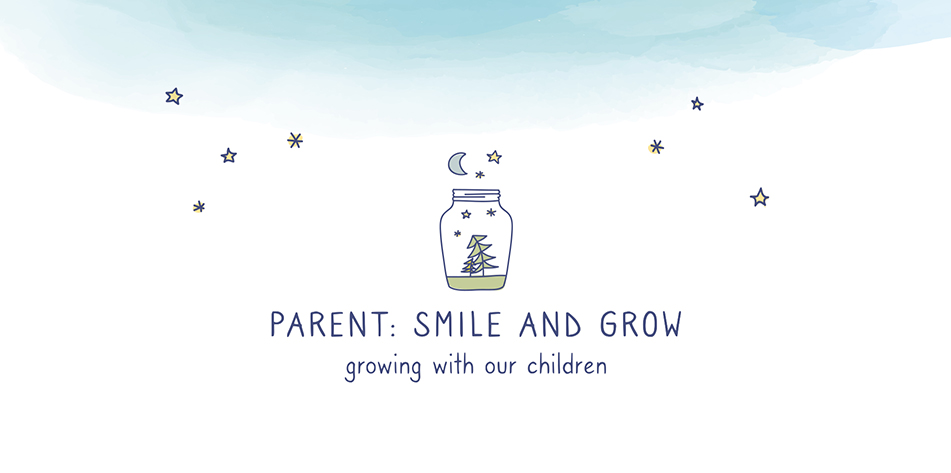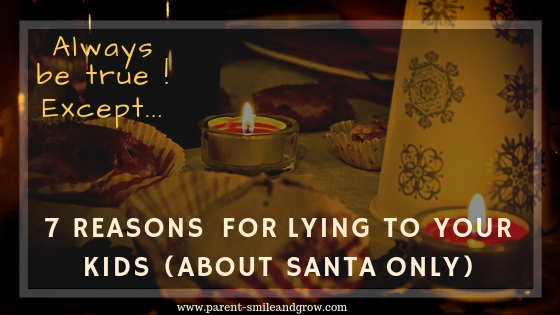Always be true. That’s something I claim as important, or even fundamental, throughout this blog and my writings. Model honesty to your kids. Why would I declare loud and clear here that you can make an exception to this rule and lie to your kids about Santa? Many of you let their child believe in some kind of character that brings presents between December and January. I do it mainly because that’s how I’ve grown up too.. Don’t you? But you know, from time to time, I like to challenge myself by reconsidering things I do automatically.. If you’re like me and need some change in perspective, here’s my guide on why you could choose to lie to your kids about Santa, without harm to the relationship with them.
Table of Contents
The debate around the Big Lie
I read and heard controversial opinions about whether it is good or not to lie to your kids about Santa. Psychologists, developmental experts, and parents around the web animate the debate. (you can read one of these interesting articles here, to name one). Kids should know the truth from birth. Or, you can lie when they’re under 3, but then you need to tell them. Go with a white lie : you don’t say he exists, but you don’t say he doesn’t exist either. Your kid will figure that out some day.
What’s your position, by the way? And how does it make you feel? Are you comfortable with plain lying to your child, or do you feel awkward and come up with the strangest solutions?
These 7 points may come in handy 😉
Lie to your kids about Santa? Reason 1 : We can build our own myth

Even as an adult, I love indulging into this idea of a sweet, funny man, with his hoard of elf and reindeer, taking the burden of transporting a massive amount of presents all around the world. Of course, I KNOW it’s a fantasy; but sometimes, I just like to imagine it could be real.
This, of course, raises all kind of issues. For instance, when we donate presents for disadvantaged children, the first question would be : Why doesn’t Santa bring gifts to those children, first? My kids haven’t asked me that question yet. And don’t think I would lie then.
But I still like that we can indulge in a common dream, especially now that they’re in that fantasy age without boundaries to their imagination. And imagination fosters cognitive and social development. So..it’s a win-win!
Lie to your kids about Santa? Reason 2 : I believe in magic
When I was a kid, I LOVED anything Christmas-related. It was a dream, a fantasy made true. In Italy, besides Father Christmas, we have a female figure, called Befana.
She is a sort of good witch who comes in the night before January 6th. Children hang socks up the chimney, and the Befana puts sweets and candies. When I’d found out that Father Christmas didn’t exist, I was so happy to at least have the Befana (sounds silly right? How in the world could I not make 1+1?). That very Christmas my parents left a handwritten, shaky note from the Befana on our window-still. I was radiant.

So much so, that I was still fantasizing over what magical trick I could have asked to Befana.
One day, I told my mom “Mom, I can ask Befana to give me a magic wand! And with a magic wand, I’d make money disappear, and we could all exchange things, and everybody would be happy!” and my mom kept answering that it wasn’t possible, and I kept asking “Why?” (I was probably very insistent). In the end she snapped “But Befana doesn’t exist, she can’t give you a magic wand, magic wands don’t exist either!”
And I wept against the car window, still thinking that magic DOES exist!
I wasn’t mad at my parents for the lie. I was mad because I still wanted to believe. So I basically made up a compromise. I thought that maybe Santa does exist, but can’t come up to where we live. Maybe he just brings presents to the children nearby. As long as I couldn’t verify that he didn’t exist, than he could still be somewhere, right?
Lie to your kids about Santa? Reason 3 : I don’t want them to be good

One of the reasons why some claim it is bad to let your children believe in Santa, is because they shouldn’t be afraid of not deserving love (and presents) when they don’t behave as expected. And I completely agree : I also want my children to know they are loved NO MATTER WHAT.
And therefore, I don’t usually tell them “You’d better be good or you won’t have any present!” Sometimes they ask me. Do you think I was good enough? “You’re ALWAYS good enough. Sometimes you make poor choices, or you do something I don’t like.”
Don’t tell your kids that Santa brings them presents as a prize for good behavior. He brings presents because he loves to make little children happy. It all depends on the message we give them! There are other ways to teach our child to cooperate.
Because the issue here isn’t about Santa. It’s about the way we parent our children; for instance, by replacing menaces and punishments with consequences for poor choices. (There’s a major difference in the meaning of the words we use with our kids, and the lessons they can learn!) It’s about fostering intrinsic drives for positive behavior, instead of external rewards.
Lie to your kids about Santa? Reason 4 : Let’s talk about our values
Taking the time to think about the important people in our lives, sharing a nice moment.. But let’s face it. The majority of us, even the most organized ones, always end up rushing through December in a constant buying mode.
We have a list and we tackle it with the urgency of a major deadline in front of us. It becomes a source of stress right?
There had been years when I hated Christmas. I hated that everything was a MUST. Even decorations.

But you know what? Despite all the stress, the moment I see a friend or relative light up because I gave him something he likes, that moment repays me off everything.
Truth is, we should give presents (and by that I mean a kind word, an unexpected phone-call, some of our time) throughout the whole year. But the routine catches up and it becomes difficult to maintain this good proposal.
Christmas time reminds us of the people that are important. Of the importance of thinking about them all, and figuring out what could make them smile. What could make them happy. We finally take the time to think about our loved ones, their passions and tastes, and pick up something we imagine they can enjoy.
And I think explaining all this process to our children is also a nice lesson for them. Because Christmas is, most and foremost, about giving and sharing. Santa is what we tell our children. It’s, for me, a good occasion to talk about our values.
Of course, you can very well do the same without Santa’s involvement. He just creates a very good excuse for talking about it with powerful images.

Lie to your kids about Santa? Reason 5 : Sharing memories and traditions
As a child, I used to leave Santa and his reindeer a glass of water, and sometimes something to eat. We would think :”Poor them, they have to work so hard, they’d be happy to restore a little”. Sometimes we left him our drawings or notes, to thank him.
I loved this tradition, and the caring message involved; and I just like that we continue to maintain this tradition alive, by adapting it to our own family with slight touches. I think those are such sweet and lasting memories, and they’re the most precious gift we can offer our children as it partly shapes who we are.
Lie to your kids about Santa? Reason 6 : Encourage their own thinking
My children haven’t asked me THE QUESTION yet. “Is Santa real?” I don’t think I would plainly and blatantly lie by saying “Of course!”, and I don’t encourage you to do that either. (So maybe as in this respect : No I don’t think it’s good to directly lie to your kid. Not in front of a direct question.)
Depending on their age, children will gradually start to make their own version of the truth.
I would turn the question into another question. “Who knows? What do you think?” And if they asked me what I do think, I’d tell them my truth : “I think it is nice to believe that there is someone that cares about you so much”.
That reminds us of the importance and the beauty of giving. I like to imagine that there’s someone who just spends his life preparing and giving presents to make children all around the world happy.
Lie to your kids about Santa? Reason 7 : Telling the truth or sparkle with hope?

Finally, I’d say.. Sometimes, we do feel it is ok to lie to people. When we have bad news for instance.
Imagine you’re sick or having serious trouble, and you’re on the phone with your old mother who can no longer help you with such matters, but still worries like crazy about you. Would you tell her “Don’t worry mom, everything’s under control!” Or would you tell her the plain truth; knowing she can do nothing but feel a lot of pain for not being of help? The answer is personal, and I don’think there’s a right one or a bad one. I just think it would be justified to lie.
And I feel is a little of the same story here : Believing in magic and sharing this excitement make children dream and smile so much. They’ll find out it’s a myth. And we can tell them that we just wanted them to dream for a few years, and share their dream.
When we have a honest and deep relationship with them, Santa will not matter.
Lie to your kids about Santa? Either way…
Either way.. It all depends on what you convey. According to your own beliefs and priorities, it’s the message you give that will shape the relationship with your kids. But not just at Christmas time. Sharing nice moments together.. With or without Santa. 🙂
What have you told your kids? Did you believe in Santa as a child, or in any other figure? Did that reshape your relationship with your parents? Share your thoughts and stories! The debate is ongoing, it’s interesting to open our perspectives!
A few found books to talk about Christmas with your child
Some amongst many worthy books (affiliate links) :
- [eafl id=”1761″ name=”cat in the manger” text=”Cat in the Manger”]
- [eafl id=”1763″ name=”Grandpa Christmas” text=”Grandpa Christmas”], to tackle the importance of caring for our planet and our dear ones
- [eafl id=”1764″ name=”The Christmas miracle” text=”The Christmas miracle of Jonathan Toomey”], to share the magic powers of love
- [eafl id=”1765″ name=”Christmas Carol” text=”A Christmas Carol”] – the Dickens’ classic!

